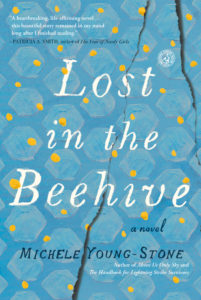One afternoon, I went to the shed for a trowel. The honey bees trailed, flying through the doorway, swarming the ceiling. I grabbed the gardening gloves and looked up. More came. And more. There were thousands of them. “Is Sheff with you?” I asked, expecting an answer, as odd as that sounds. I watched and waited. They gathered in a T-shaped mass that framed the rafters, and I got down on my knees. Then, down on my back, the gardening gloves still in hand. I waited for them to say something. Rather, they came together, a gold-and-amber disco ball, bees zipping out from the spinning center, then descending, not falling, but aiming, a thousand bullets, on my skin. They were going to kill me, maybe finish what they started when I was seven, but then I felt their tiny fuzzy legs on my skin. My limbs vibrating with theirs. I slipped off my sneakers as the bees crowded onto my face and neck. I was not afraid. We hummed together. Their legs sticky on my eyelids. Ascending. Defying gravity. They felt like salvation. The sound had walls, tissue thin, and deep inside the cell, I saw Sheff shooting his arm into the air, a rocket, the bees flying out. We had our whole lives ahead of us. He straddled my red suitcase at the New York Public library. I shot my arm into the air. Then, saw that it was golden with bees. I heard a man’s voice, Jacob calling my name. The bees rose like sunlit dust.
Jacob’s dark boots were by my face. “What the hell are you doing on the floor?”
I squeezed the gardening gloves and sat up.
“Are you all right? Did you fall?” When I didn’t answer, he said, “I’m seriously worried about you.”
Maybe I wasn’t all right. That was a possibility. I looked at my arms, at where the bees had been. I looked to the ceiling. They weren’t there. I sat up. “I’m sorry.”
“What are you doing in here?”
“I was getting a trowel.” I showed him the gloves as though that helped explain why I’d been lying on the floor of the shed.
As Jacob pulled me to my feet, I looked once more for the bees. There was no sign of them. Had I imagined them? I felt caught between two worlds, one where I was special, some magical beekeeper, and another where I did what I was told. I kept the house neat, made dinner, spread my thighs as wide as they would go. I was a trapeze artist walking a tightrope. On one side just beneath me bubbled the oblivion of living like this forever, this angry man never letting me forget that I was always wrong. I wasn’t sure exactly when it started, when it became clear, that I was no longer in control of my life, that everything, including my own happiness, depended on Jacob’s happiness. One day, it just was. I think that the seeds were planted early on. Maybe I should’ve known that something was seriously amiss when he said that no professor could teach him anything. Maybe I should’ve known when he was rude to that doctor. Maybe I was so caught up with the idea of marriage and normalcy, that I lost the ability to distinguish between cruelty and kindness. All I knew for certain was that two years into our marriage, I was sorry every day for everything. I could do nothing right. I said the wrong thing, looked at him the wrong way.
Because I was always wrong, he shoved me. It was my fault. I shouldn’t infuriate him so. Then, he put his hand to my throat because I wouldn’t shut up. I said the wrong thing again. He said, “If you really love me, you’ll stop pushing my buttons.”
I tried, and I failed. When I fought back, he laughed. Later, he cried. “Why do you make me act this way? All I want to do is love you.”
Either way, just two years in, I had mastered walking on eggshells. I listened for agitation in the voice, for sarcasm. I said whatever I thought Jacob wanted to hear. I agreed with everything he said, backtracked and apologized if I upset him. I accepted responsibility for his anger, found a good hiding spot, the shed and sometimes the pantry. I thought about leaving him, but my life, the eggshells, took on a surprising normalcy, and the more time that passed, the easier it was to keep doing what I was doing, to pretend to be someone I wasn’t, to tolerate behavior that Jacob argued, “is perfectly normal. A man loses his temper. Just because your father’s a pansy doesn’t mean every man is.”
But then, holding my balancing stick, my feet wobbly on the tightrope, was the other side: the soft sweet side where Betty and the bees gathered. In that spot, there was cool water and sunlight, and I could be myself. Only I didn’t think I deserved that—happiness.
